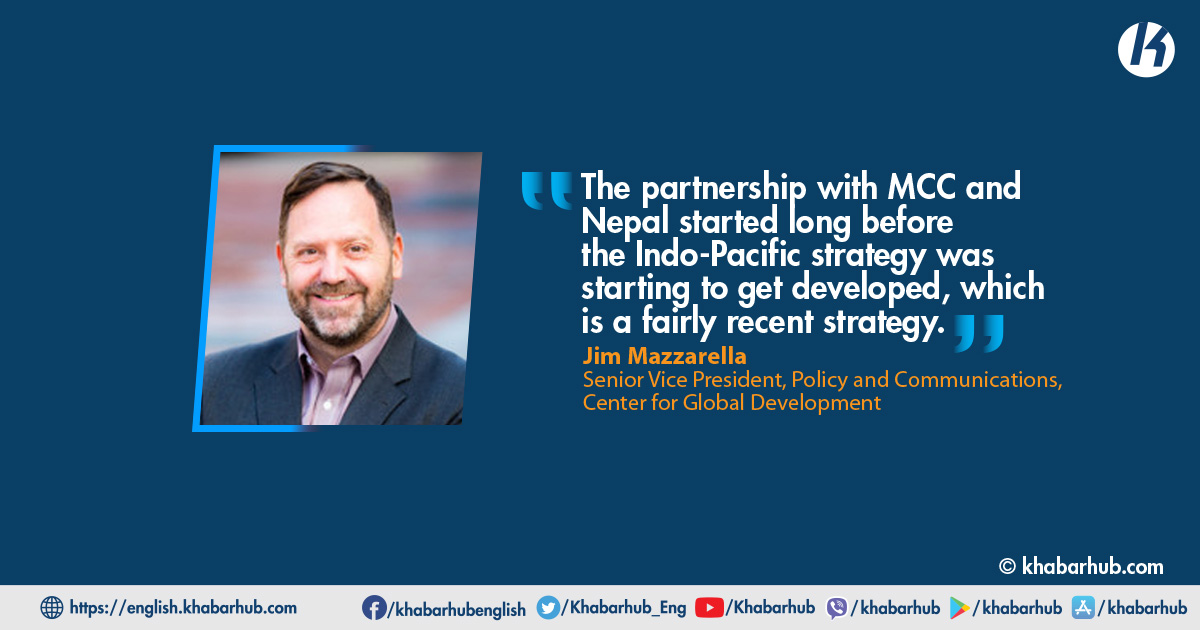Jim Mazzarella is a Senior Vice President of Policy and Communications at the Center for Global Development. He joined GIF after serving at the White House’s National Security Council as Senior Director for Global Economics and Development, where he was one of the primary architects of the new U.S. International Development Finance Corporation, and over a decade at the Millennium Challenge Corporation, the American aid agency that focuses on impact evaluation as a core tenet.
Dr. Pramod Jaiswal, Strategic Affairs Editor at Khabarhub had a discussion with Jim Mazzarella, a Senior Vice President of Policy and Communications at the Center for Global Development on Millennium Challenge Corporation and Nepal.
What is MCC? Why MCC? How does it work? What was the need to establish MCC? Who are the target beneficiaries of MCC? What sector does MCC focus on? Since MCC is a grant-based project unlike the other projects of the United States, how does MCC draw funds for its project?
To answer your question, why the United States created MCC and where the funding comes from, we have to go back and understand why any country provides assistance to people in another country and there are various reasons for this of course, depending on the type of assistance.
But the modern system of providing economic assistance, like MCC, started mainly after World War II when the United States was providing European countries with grants and loans through the Marshall Plan.
This plan helped create economic growth for both the United States and those countries we were helping in Europe.
The goal then, as it is now, is not just to promote joint economic growth but also to help foster healthy labor markets, boost investment and trade, raise living standards and improve the functioning of markets around the world.
It worked in Europe and it has worked in other places that have received assistance ever since. MCC was established in 2004, decades after WWII of course to help meet those goals in a more effective way.
Not everybody in the United States supports providing economic assistance to other countries, in fact, most people don’t support providing economic assistance to other countries.
So the tension that it creates is the healthy political pressure to make sure that every dollar that the US government spends on grants to other countries is spent effectively.
Now, this meant that in 2004 the US government decided to change the way it provides for a small amount of its funding and change that with three main principles in creating MCC, the first one being don’t waste money on poorly governed countries, countries with governments that have no commitment themselves to growing out of poverty represents a waste of scarce resources, so MCC will partner with countries that are committed to good governance and to create a sustainable environment to reduce poverty.
MCC was told by the creators, the United States Congress, to figure out which countries are committed to good governance, and so they have a scorecard and they go through a process every year to only select partners where a dollar of MCC funding would be spent effectively. So in this way MCC is not a gift, it’s a partnership, it’s a recognition that a country has made tough political reform and is committed to their own people’s poverty reduction.
The second major principle that MCC by law is required to follow is that it must respect the sovereignty of the people it is seeking to help, both in determining which projects are to be funded and also, how those projects are to be implemented.
So, the local population is smart enough to know what the real problems are in their own country. This might sound obvious, but it is a real revolution, in 2004 how assistance was provided.
If the local population is not part of the solution then the projects won’t be sustainable and so it is the responsibility of the partner governments, in this case,
Nepal, to carry out those projects themselves, they propose the projects themselves and they carry out the projects themselves, by what you call it Millennium Challenge Account Nepal.
MCC is only there to ensure that these projects are completed on time and without corruption, that’s a really critical part, we don’t want the money that the United States government is providing to be stolen.
The third principle is to let economics lead the way, so in the United States, unfortunately, this is a very strange concept but it’s the one that is embedded into the MCC law, all the projects that are proposed must have proof that they’re justified by economics and not politics.
These three bedrock principles and MCC’s internationally recognized commitment to transparency have made it extremely respected and sought after by countries with emerging markets. Every year governments all over the world hire lobbyists to try and qualify for MCC funding.
They go to Washington, they say I’m friends with so and so you have to give us money, you need to give the MCC Compact to my client, but the money that these governments spend is a total waste because MCC uses data, measurable facts to determine who they will partner with and what projects they will fund, so it’s a competition to reduce poverty and the one frankly that I think Nepal risks losing now because it’s taking so long for the agreement; the partnership that was signed in 2017 to actually go into implementation.
So now, who makes sure that MCC stays on course for these principles?
Primarily, the United States Congress and actually people like Sarah Rose, with whom we’re going to be talking to you in a few minutes.
The members of congress are very serious about doing the oversight on MCC to ensure that the executive branch of the government does not try to use MCC for purposes that the law prohibits, for instance, no military use of funding is allowed by law and the members of Congress take it very seriously and as I said, Sarah Rose and Conor work in Think Tanks that track MCC very closely to make sure that they don’t deviate from these principles.
Congress looks at every grant to see if the economic benefits that are promised will be enough to justify the costs of the projects.
So, given that the partnership with Nepal was signed in 2017, I’m surprised that Congress, which is providing U.S taxpayer dollars, has not demanded that MCC take back funding that’s been set aside for Nepal.
There are many uses domestically and even the other MCC countries that could have this funding. If the government of Nepal doesn’t want to actually finalize the Compact and move forward to build safer roads and have better access to electricity that is included in the partnership, the Congress could say those funds need to go elsewhere and other partnerships that were signed around 2017 like the Morocco Compact are already close to finishing when the Nepal Compact isn’t even started yet.
So Morocco is almost ready to finish, Niger is almost ready to finish and these were Compact partnerships that were signed back around the same time that Nepal was. So I hope that gives the overview that you were asking for, if not I’m happy to answer more questions.
Is there a link between MCC and Indo-Pacific strategy? In Nepal often MCC is linked with the Indo-Pacific strategy, so do you think there is any link between the two?
The partnership with MCC and Nepal started long before the Indo-Pacific strategy was starting to get developed, which is a fairly recent strategy.
So the partnership started in 2011 with the threshold program in order to meet the objectives of Nepal and MCC, so I think that’s the answer, the partnership existed long before the United States and Indian and other allies in the Pacific were seeking closer ties.
And as far as I know, it has nothing to do with it, the United States for the last number of years does have an interest in promoting allies throughout the Indo-Pacific region, Australia, and others but again this Compact was negotiated and the partnership for the Compact was agreed to way back and finalized way back in 2017 before there was any sort of discussion about this. So that’s my thought.
It’s one of the reasons why the transparency element of MCC is so important. Anybody in Nepal can go online and see if my government meets the minimum qualifications for being well-governed enough?
How does my government compare to other governments that MCC funds- in Africa for instance. All the governments are ranked against each other and it’s all transparent so if Nepal did not meet the criteria to not finish high up in the competition with other governments, all across the world, then they wouldn’t be eligible for this.
There are other countries in Asia; Southeast Asia in particular, that the State Department would love for MCC to work with and they don’t.
I won’t name them here because I don’t want to give anybody a bad name but there aren’t that many countries that are qualifying for MCC that would be part of the Indo-Pacific strategy.
So I don’t understand the basis for the question to think why Nepal? Why not Vietnam? Why not all these other places? They don’t qualify for MCC funds because of the transparency anybody in Nepal can go online and see why they qualify for MCC funds. Transparency is a hallmark of MCC for just this reason in case people have questions about it.
Nepal has asked for some amendments in the MCC Compact, but the US has rejected this idea. If some changes or amendments can get the project endorsed by Nepal’s parliament, what is the harm in getting it ratified?
I think the premise of your question is- maybe the Compact needs to be amended. Some people feel the Compact needs to be amended in order to get it ratified.
Compact was negotiated with two sovereign countries, Nepal is a sovereign country and it’s in a partnership with the United States and there are rules and responsibilities in the Compact laid out for both parties.
The United States needs to make sure that it doesn’t start funding it and then pull away funding, the United States has to maintain its good faith and credit in the Compact and Nepal has to take those funds and then implement the projects as negotiated.
It took years to negotiate this with the Government of Nepal and it was agreed to by both parties at very high levels. It was reviewed by the Justice Department in Nepal, by lawyers in the US government to ensure that the sovereignty of both countries was maintained and that the projects were relevant and right.
So it’s been signed and it’s done, at some point, you have to stop and move forward and MCC requires parliaments of the partner countries to ratify it because it is an international agreement between two sovereign countries and we have to ensure that the people as represented by their parliamentarians have fully endorsed the projects because it’s not easy.
Getting an MCC Compact isn’t easy and implementing them are not easy, you have to do it within five years, there’s a lot of infrastructures involved, you have to meet timelines, you have to get these projects done or the money goes away so because of that there’s a responsibility that the government has to meet to its people and to the United States.
As far as I know, the Compact has been negotiated and it’s along the same lines as every other Compact that MCC has partnered with, every other country that MCC has partnered with I don’t know what they’re up to 30 or so Compacts and it’s either time to move on or walk away.
What is America’s experience in dealing with the development projects under USAID? Is it different from MCC or do we have similar stories? Secondly, you may also share the experience of MCC and USAID or USAID issues in other countries where these institutions are working?
When Sarah says the government, she means the Nepal government, not the US government, the Nepal government or the Moldovan government or the Nigeria government, they’re the ones who have to implement the MCC projects because it is owned by the people in that country, unlike USAID where USAID is actually implementing those and that means putting out the procurements and contracts and overseeing it and making sure it gets done.
There is some overlap in some countries, USAID for instance in Moldova was working on irrigation systems in one part of the country and the Moldovan saw that it was a good program and it was working well.
They came when they were producing their list of proposals to MCC, they said ‘can you replicate that in a different part of the country?’.
So MCC wasn’t working but USAID was, but they were doing the same thing, they were taking that same program that had been proven to be working well in Moldova.
In Jordan, there was a Wastewater Treatment Plant that the government once needed to expand. And it had been built originally in the 70s or the 80s by USAID and so it had to be doubled in size.
But again it was the people of Jordan and the Jordanian government who said this is good but it’s just not enough,
Can you help us make it bigger?’ And so being driven by local needs allows MCC to sometimes do what USAID is doing and sometimes do things totally differently.
Will MCC prevail over the local laws of Nepal? Do the local laws have a lack of access to the MCC project?
I’d like to clarify MCC, the Compact doesn’t necessarily prevail over local laws. The Constitution of Nepal is paramount in any partnership and MCC doesn’t want to break any laws so that’s why it’s part of a negotiation with the local government and that’s why the Parliament has to look at it.
And from what I understand the Department of Justice in Nepal has looked at it and says that there are no laws that the Compact breaks because that just wouldn’t be a part of it.
There are times perhaps when an MCC person who’s in the country has to have since they’re part of the embassy, the protections of the embassy like any US diplomat like Nepal’s diplomats have in the United States, the same reciprocity. There are sometimes issues around tax.
There are some countries in Africa that have wanted to tax the grant dollars or attack the people who are working on it and so obviously, if this is funding from the US government, having something taxed is not really appropriate.
So, those types of things are all spelled out in the Compact, it’s all transparent you can all see it on the Compact and there’s no attempt to prevail over local law at all if anything the Compact is going to ensure that certain environmental and social and governance standards are higher than local law.
I don’t know if that’s the case in Nepal or not. I don’t know about Nepal’s law but MCC has to make sure that any projects that we are funding; the Nepal government is implementing, we have to have very high standards to ensure that there’s no environmental degradation.
If anybody has to be displaced, they’re fairly compensated and moved to a good place. Those are the types of provisions that might not be in Nepal’s law but are going to be in the Compact to ensure that Nepal is better off than when MCC started.
The MCC is delayed by years. How much does this delay cost Nepal or what has Nepal missed? And what are the gains for the US government if MCC get endorsed? If MCC constructs the Electricity transmission line and road maintenance, how will it serve the American interest? How will it fulfill America’s interests?
I would say that there is some cost to Nepal for not moving forward and these are what we would call ‘opportunity costs’.
Had MCC been implemented in 2017 when it was signed and maybe a year or so later, because it always takes a little bit of time for the government the local governments to set up the units, and if it had been worked in 2018, how many people have died on the roads in Nepal that MCC was working to try to make safer and better?
How much more economic activity would have been created if the transmission lines and the power and the reliable power had been turned on by now?
How many rural communities would have had electricity now if we had moved forward with this? How many people couldn’t get to the hospital or how many hospitals didn’t have electricity because the Compact didn’t move forward?
That’s a really tremendous social cost. How much money would Nepal have made by selling their electricity to India? a significant amount so I feel bad for the people of Nepal that it has cost them so much in terms of social capital and social goods.








Comment